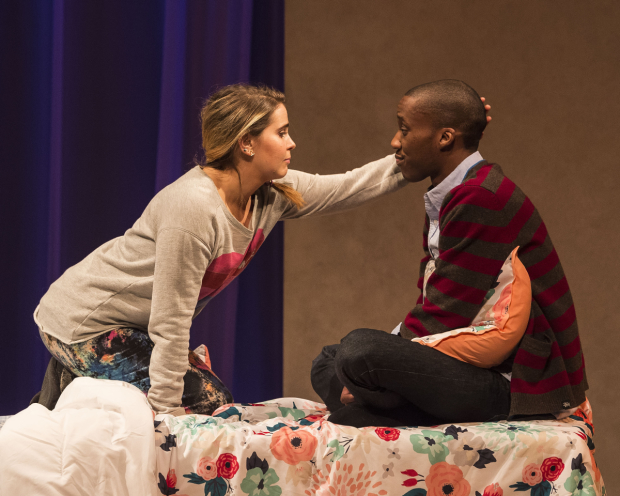The Mystery of Love & Sex

(© Craig Schwartz)
Mom's a joint-smoking mess and that's when she's faithfully taking her medication. Dad's a successful author of detective fiction but also a casually racist bully. Their college-age daughter drinks too much and can't figure out whether she's gay, bisexual, or neither, and the daughter's best friend (and neighbor) since childhood has issues far too complicated to list. Within Bathsheba Doran's The Mystery of Love & Sex, self-destruction and dysfunction infect the branches of this contemporary clan's family tree like an insidious blight.
Nonetheless, it would be a mistake to dismiss Doran's smart and very compassionate drama as a nasty, would-be sitcom. Love and kindness ultimately conquer if not all, then quite a bit, in the West Coast premiere of The Mystery of Love & Sex, directed by Robert Egan at the Mark Taper Forum. In the top-notch performances of David Pittu, Sharon Lawrence, Mae Whitman and York Walker, Egan's production supplies us with both a cracked looking glass and an evening of darkly funny entertainment.
The play tracks four people — mom, dad, daughter, and daughter's best friend and soul mate — from daughter's school days through adulthood successes, romantic crash-and-burns, and every conceivable betrayal. Every character in this incarnation of a "modern family" thinks he or she has this relationship thing all figured out. And they're pretty much all mistaken.
As they assemble a meal of dry salad and butterless bread for their parents, Charlotte (Mae Whitman) and Jonny (Walker) are enacting their own version of domesticity. They call each other "angel" and honey" and chide each other like…well…like the old married couple that Charlotte's parents, Howard (Pittu) and Lucinda (Lawrence), actually are. It's not an act. Jonny's mother is a longtime neighbor of Howard and Lucinda's back home; the kids have known each other since they were nine and have followed each other to college. She's a Jewish girl heading for a career in politics. He's an African-American man thinking about teaching English.
Have they now become an item? Unclear. "We are very much beyond dating. In the conventional sense," Charlotte tells her inquiring parents when Jonny is out of the room. "I can't live without him. That kind of thing." There's a reason behind Charlotte's evasiveness, which will become apparent after the meal is over, the booze starts to flow and Jonny and Charlotte start to debrief. Turns out Charlotte thinks she has fallen in love with a girl, and a not-at-all jealous Jonny encourages her to act on it. When Charlotte uses the word "comfortable," Jonny replies "I want so much more than that."
Ultimately that's what everybody wants. Unbeknownst to Charlotte, her parents' marriage has hit a rough patch and will fall apart as Charlotte's first gay relationship is flourishing. Jonny's personal and professional growth will have uncomfortable reverberations with Howard, who, in addition to already being a successful writer, is proudly Jewish and fiercely protective of his daughter. Plus he doesn't always choose his words wisely, which seems to be a family trait.
Love & Sex may be a series of conversations, but Egan's production is never static and frequently very funny. Lawrence moves through the play with the diffidence of a modern-day Blanche DuBois who has shed all her filters. She lands many of the play's most outrageous lines with solid comic timing. Less apparent in Lawrence's work is a sense of the pain or self-loathing the much-compromised Lucinda may be experiencing.
Whitman (who played a teen on the series Parenthood) makes Charlotte the play's conscience. Eschewing showiness, Whitman's Charlotte is completely — and often heartbreakingly — a woman stretched between the dictates of her family, her best friend, and her heart. Doran has written a multilayered role, and Whitman plays it for all it's worth.
Radiating wit and sensitivity, Walker anchors the play's sociological sections. Doran has structured Love & Sex to be equal parts relationship drama and cultural discussion, and when Walker engages with Pittu's Howard over Jewish or African-American debates, the scenes carry a real spark. Walker's chemistry with Whitman is also considerable; the two easily convey a complicated and messy relationship.
Pittu's work is superb. In his hands, Howard comes across as simultaneously arrogant and dismissive — the kind of father whom a daughter would renounce important things for. Pittu nails the tender moments and a late-play grand gesture that could well have folks in tears.
Audiences should plan on experiencing love-hate fluctuations with each member of Doran's familial quartet. We are in the presence of some unapologetically screwed-up people, who become even more flummoxed by their capacity to love. Doran offers no key to unlock the mystery of love and sex. But then again, what sane person would even want one?











